Interview with Tracey Kruger, Vice President of Marketing, Advanced Bionics, LLC
Topic: Neptune Sound Processor
CAROLYN SMAKA: Today I'm speaking with Tracey Kruger from Advanced Bionics. So Tracey, can you tell me about your role with the company?
TRACEY KRUGER: I am an audiologist as well as the Vice President of Marketing for Advanced Bionics.
SMAKA: Before we get into some of the latest developments from Advanced Bionics, can you provide a brief company overview of Advanced Bionics.
KRUGER: Advanced Bionics is a medical device company that manufactures cochlear implants. We have been established for 19 years, situated in Southern California. We were originally started by an entrepreneur named Al Mann until the early-to-mid 2000s when he sold the company to Boston Scientific. He bought it back with the shareholders, and later in December 2009, sold it to the world's largest hearing healthcare solutions company, Sonova.
Until recently, Sonova's main focus was on the manufacture and distribution of hearing aid products, although it now includes a medical division focusing on the manufacture and distribution of cochlear implants. In addition, Sonova owns some hearing aid retail operations, and is the market leader in wireless communication systems for audiology applications. The history of the hearing industry fundamentally changed when Sonova purchased Advanced Bionics. We have access to 60 years of proprietary Phonak technology that no cochlear implant manufacturer has ever had access to prior to now.
For Sonova, the goal in acquiring Advanced Bionics was to expand their offerings and grow to a full-service hearing healthcare solutions company. We have been working under the Sonova umbrella for approximately two years, and there has been a lot of positive change for Advanced Bionics in that time. We have been able to work closely with one of our sister brands, Phonak, which is the largest hearing aid company in the world. We are working on projects to leverage key technologies from both companies to create innovative solutions that have not yet been offered for cochlear implants, but have, in many cases been offered for recipients of Phonak technology for some time.
SMAKA: It seems that as far as professionals go, people either work with hearing aids or they work with implants, and the idea of the convergence of the technologies is really exciting for both sides, especially now with more bimodal fittings.
KRUGER: I think that's true as well. We've been focusing heavily on leveraging the technology of both companies, not only to further the benefit of cochlear implant recipients, but also looking at bimodal hearing and how we can improve the experience of recipients of both an Advanced Bionics (AB) cochlear implant and a Phonak hearing aid. As you said, a lot of audiologists who fit hearing devices either fit cochlear implants or they fit hearing aids. Bimodal hearing is an interesting and exciting space, but also one that requires a lot of thought and effort in figuring out how to bring forward products in the best way possible both for professionals as well as the recipients. We believe that the marriage of these technologies will change the industry.
SMAKA: Tell me about the new Advanced Bionics sound processor, Neptune.
KRUGER: Neptune is the most recent sound processor innovation by Advanced Bionics. We launched it commercially first in the United States in December 2011, and then shortly thereafter in Europe and many other countries around the world. We have had an unbelievably positive response to the product from both recipients and professionals. Neptune includes many new features but the most outstanding is the fact that it's the world's first fully swimmable, waterproof sound processor.
Until now, cochlear implant recipients had to remove their sound processor prior to water activities. Neptune was designed for recipients to use while doing their everyday activities, like any other sound processor, in addition to using it in the water such as while swimming in a pool or taking a shower or bath. You can understand how important that is, especially for children. Think about a young baby with a cochlear implant. Being able to have a bath and hear and learn in an environment where he/she has one-on-one interaction with a parent in a very fun and playful setting is a special moment and invaluable for language enrichment. Adults also want to be able to hear and communicate while swimming as well as work and exercise in humid, wet conditions without worry. For these reasons, this has been a really important product, with great appeal across the market!
SMAKA: I love the photos of the children wearing it while swimming underwater. Adorable!
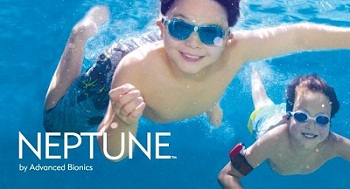
KRUGER: We agree, and those are real kiddos with their AB cochlear implants, too. Since we launched Neptune, we've had many families post video and photography to various social media sites with their little ones being able to hear in the bathtub for the first time, listening to their parents' or their siblings' voices and singing. It has been fantastic, and there have been a number of teary moments across the company, as well for some families, too. You can understand how emotional it is for adult recipients and parents of children with cochlear implants to finally be able to hear and communicate in situations where they previously could not. A lot of these recipients and their families told us that they didn't know what they were missing until they actually had the ability to use the Neptune in situations where they previously had taken the processor off and were unable to hear.
We've had a lot of parents comment about their children taking swimming lessons. Every parent wants their child to be safe in the water, even if they don't have a pool at home. If they're in a situation where the child is near lakes or an ocean, parents want to know that the children are educated about water safety. Swimming lessons are an important part of childhood, and children who were unable to wear their sound processors during swimming lessons were in a very, very difficult situation. Often, the only way that they could communicate is either through written instruction or through stopping what they're doing and trying to lip-read. Parents and instructors set up a variety of different tactics to be able to teach and communicate what they want them to do next. You can imagine how slow-going swimming lessons are for kids who are not able to hear.
One parent commented to us that her child had been in swimming lessons for quite a long time, and that after just one swimming lesson using Neptune, her child learned more than she had cumulatively in all the other swimming lessons, just because of the ability to hear and communicate. It's pretty important.
We also had a mother share her experience with her child at the pool. Because the child wasn't wearing her sound processor at the pool, when the lifeguard said, "Stop running!" all the kids stopped running except for hers, and she had to go chasing after him. She said that she felt like the mother with the disobedient child, instead of the mother with the child who couldn't hear the lifeguard.
Each time they are reminded that their child is different, parents may go back through the grieving process a little bit. That's a tough thing for families, and we can make that a little bit easier;that's a fantastic feeling for us.
SMAKA: I know with hearing aids, one of the challenges of waterproofing a device is water getting into the microphone as well as the battery compartment. How do you achieve that with the Neptune sound processor to enable it to be repeatedly submerged and swimmable?
KRUGER: The Neptune processor is hermetically sealed. It's completely encased so that no water can get inside. The battery compartment is protected through the use of seals. When you're putting the battery door on and taking it off, you can feel a nice, tight hermetic seal. The microphone located within the headpiece is protected from water through a series of waterproof membranes and connectors.
The other way that we were able to ensure that we could waterproof Neptune was by having removable controls. The controls for Neptune can be left on the processor so that you have access to volume sensitivity, the program switch as well as FM. But for those who want wear Neptune in its smallest configuration or in water environments, the controls can come off with the push of a button, and then it is completely protected from water.
In addition to its waterproof protection, Neptune also has the industry's highest ingress protection rating for particles, which would be helpful, for example, for a construction worker who's worried about getting dust and particulates in the processor. We've had some working professionals say to us, "This is amazing. I can work in the field. I don't have to take my processor off in these certain circumstances." The same goes for kids on the playground or at the beach.
In the past, we've had a lot of customers who are woodworkers, and the little wood particles get stuck on their processors, making them really difficult to clean. The nice thing now about Neptune is you can just rinse it off.
SMAKA: Oh, my! That was the last thing I thought you were going to say - "rinse it off."
KRUGER: I should note that the removable controls also make Neptune childproof. Without controls, there is no worry about the child changing or bumping the volume or program.
SMAKA: And we know that can be very important.
KRUGER: Yes, when we were in the development process for Neptune, we knew that being able to have childproof controls was a really important feature and we specified that in the requirements for the system. Technically, having tamperproof controls is often very difficult to achieve and is at direct odds with the controls being easy to use, which was also a requirement.. There are very few controls that exist in the market today that are "tamperproof." Some are better than others, but to have them completely tamperproof is unique. I have to give credit to our engineers for coming up with such a creative solution to a difficult problem!
SMAKA: How is the Neptune processor powered?
KRUGER: This processor runs on a disposable or rechargeable AAA-battery, and this feature has been very appealing to patients and families. The ability to buy disposable or rechargeable batteries off the shelf in any store anywhere in the world is very attractive. It also results in the industry's lowest operating cost for the sound processor. The ability to purchase batteries for a very small amount of money is important everywhere, and especially in countries where there is no reimbursement for cochlear implants and families are paying out-of-pocket for the care and operation of their cochlear implant system.
SMAKA: Tell me about how Neptune is worn.
KRUGER: Neptune is worn in a way that we call "freestyle," which really means being able to wear it anywhere you like and however you like, and not being limited to having to wear it behind the ear like traditional sound processors.
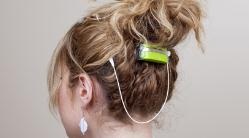
Neptune sound processor worn in the hair
We have our recipients email us with photos and stories about Neptune. We've received pictures with Neptune clipped on to a tie. A woman sent us a photo with Neptune tucked in her hair, and she showed a before-and-after shot where she lifts her ponytail, and she has Neptune clipped underneath it. People use it in armbands while they're at the gym. We have a number of accessories so you can really wear it exactly how you want to.
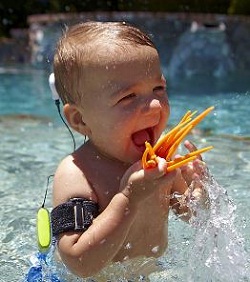
SMAKA: Are there ways you can change the look of your Neptune?
KRUGER: Neptune features 10 very fashionable (some trendy) colors for showing off your style. Recipients can select from hundreds of color combinations for mixing and matching with clothing. Skinits were made available for the Advanced Bionics Harmony sound processor a few years ago to enable recipients to decorate it however they wanted without being constrained to the various styles that we offered as the manufacturer. So, in addition to the fun colors we offer, we made Skinits available for Neptune as well. If someone wants to be able to camouflage their Neptune, add a sport's team, or wear it like a flag of the country that they are from, they can upload an image to Skinit or order one of Skinit's pre-designed images and apply it to their processor. It is a fun way to individualize the processor. We've seen a few people do that already, and it's amazing how creative some people are and how they make it part of their everyday style.
SMAKA: There are photos of what you're describing on the photo gallery of your Web site, and great views of Neptune's unique design.
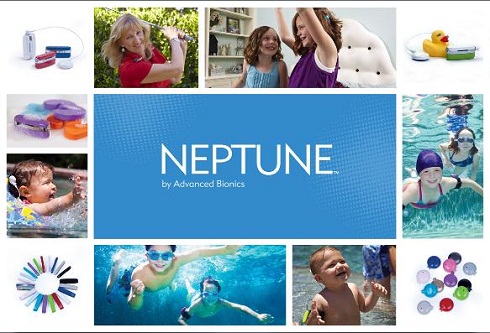
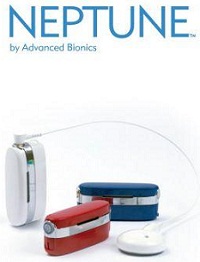
KRUGER: Neptune has recently won several awards for excellence in design. We have patients say that they want to hear their best, and obviously that was our main goal for Neptune, but it's also nice to have something that looks like an iPod in fashionable colors. It looks much more like a neat, sleek consumer electronic device than a medical device.
It is also really quite small. We have patients' mothers say over and over again, "It's so small. It's so lightweight. It's so cute. It's cool. My kids aren't complaining about wearing it. They're excited to put it on. Their friends say, 'What's your new Bluetooth?' or 'What's your new iPod®?'" There's a lot of excitement around the design.
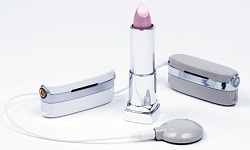
SMAKA: The one aspect we haven't touched on is hearing performance.
KRUGER: One thing that Advanced Bionics has become well-known for in the industry is our focus on patient performance. We believe that people get cochlear implants to hear better continually;that doesn't stop the day that you first get your device. Manufacturers need to push themselves to continually offer improvements that allow people who chose the device to hear better now and going forward.
We have worked on providing unique solutions that we think help our patients to hear better, including very sophisticated sound processing innovations like HiRes Fidelity120, ClearVoice and AutoSound. The Neptune sound processor takes advantage of all of the highly technical work that we've already achieved to provide the best possible hearing to our recipients. All of our sound processing strategies that run on the Harmony processor also run on the new Neptune sound processor.
SMAKA: It's been great catching up with you about Neptune.
KRUGER: Thank you, and it's been great speaking with you about it. It's been very rewarding for us to see the joy and the fun recipients and their families are having with Neptune, in addition to the performance they are getting from it. I think everyone here at Advanced Bionics feels a swell of pride every single time we hear a recipient's story about their experience with Neptune, because we know that we achieved the goals that we intended.
SMAKA: Thank you so much and we'll talk again soon.
For more information, visit the Advanced Bionics Web site at https://www.advancedbionics.com or the Advanced Bionics web channel on AudiologyOnline.
TRACEY KRUGER: I am an audiologist as well as the Vice President of Marketing for Advanced Bionics.
SMAKA: Before we get into some of the latest developments from Advanced Bionics, can you provide a brief company overview of Advanced Bionics.
KRUGER: Advanced Bionics is a medical device company that manufactures cochlear implants. We have been established for 19 years, situated in Southern California. We were originally started by an entrepreneur named Al Mann until the early-to-mid 2000s when he sold the company to Boston Scientific. He bought it back with the shareholders, and later in December 2009, sold it to the world's largest hearing healthcare solutions company, Sonova.
Until recently, Sonova's main focus was on the manufacture and distribution of hearing aid products, although it now includes a medical division focusing on the manufacture and distribution of cochlear implants. In addition, Sonova owns some hearing aid retail operations, and is the market leader in wireless communication systems for audiology applications. The history of the hearing industry fundamentally changed when Sonova purchased Advanced Bionics. We have access to 60 years of proprietary Phonak technology that no cochlear implant manufacturer has ever had access to prior to now.
For Sonova, the goal in acquiring Advanced Bionics was to expand their offerings and grow to a full-service hearing healthcare solutions company. We have been working under the Sonova umbrella for approximately two years, and there has been a lot of positive change for Advanced Bionics in that time. We have been able to work closely with one of our sister brands, Phonak, which is the largest hearing aid company in the world. We are working on projects to leverage key technologies from both companies to create innovative solutions that have not yet been offered for cochlear implants, but have, in many cases been offered for recipients of Phonak technology for some time.
SMAKA: It seems that as far as professionals go, people either work with hearing aids or they work with implants, and the idea of the convergence of the technologies is really exciting for both sides, especially now with more bimodal fittings.
KRUGER: I think that's true as well. We've been focusing heavily on leveraging the technology of both companies, not only to further the benefit of cochlear implant recipients, but also looking at bimodal hearing and how we can improve the experience of recipients of both an Advanced Bionics (AB) cochlear implant and a Phonak hearing aid. As you said, a lot of audiologists who fit hearing devices either fit cochlear implants or they fit hearing aids. Bimodal hearing is an interesting and exciting space, but also one that requires a lot of thought and effort in figuring out how to bring forward products in the best way possible both for professionals as well as the recipients. We believe that the marriage of these technologies will change the industry.
SMAKA: Tell me about the new Advanced Bionics sound processor, Neptune.
KRUGER: Neptune is the most recent sound processor innovation by Advanced Bionics. We launched it commercially first in the United States in December 2011, and then shortly thereafter in Europe and many other countries around the world. We have had an unbelievably positive response to the product from both recipients and professionals. Neptune includes many new features but the most outstanding is the fact that it's the world's first fully swimmable, waterproof sound processor.
Until now, cochlear implant recipients had to remove their sound processor prior to water activities. Neptune was designed for recipients to use while doing their everyday activities, like any other sound processor, in addition to using it in the water such as while swimming in a pool or taking a shower or bath. You can understand how important that is, especially for children. Think about a young baby with a cochlear implant. Being able to have a bath and hear and learn in an environment where he/she has one-on-one interaction with a parent in a very fun and playful setting is a special moment and invaluable for language enrichment. Adults also want to be able to hear and communicate while swimming as well as work and exercise in humid, wet conditions without worry. For these reasons, this has been a really important product, with great appeal across the market!
SMAKA: I love the photos of the children wearing it while swimming underwater. Adorable!

KRUGER: We agree, and those are real kiddos with their AB cochlear implants, too. Since we launched Neptune, we've had many families post video and photography to various social media sites with their little ones being able to hear in the bathtub for the first time, listening to their parents' or their siblings' voices and singing. It has been fantastic, and there have been a number of teary moments across the company, as well for some families, too. You can understand how emotional it is for adult recipients and parents of children with cochlear implants to finally be able to hear and communicate in situations where they previously could not. A lot of these recipients and their families told us that they didn't know what they were missing until they actually had the ability to use the Neptune in situations where they previously had taken the processor off and were unable to hear.
We've had a lot of parents comment about their children taking swimming lessons. Every parent wants their child to be safe in the water, even if they don't have a pool at home. If they're in a situation where the child is near lakes or an ocean, parents want to know that the children are educated about water safety. Swimming lessons are an important part of childhood, and children who were unable to wear their sound processors during swimming lessons were in a very, very difficult situation. Often, the only way that they could communicate is either through written instruction or through stopping what they're doing and trying to lip-read. Parents and instructors set up a variety of different tactics to be able to teach and communicate what they want them to do next. You can imagine how slow-going swimming lessons are for kids who are not able to hear.
One parent commented to us that her child had been in swimming lessons for quite a long time, and that after just one swimming lesson using Neptune, her child learned more than she had cumulatively in all the other swimming lessons, just because of the ability to hear and communicate. It's pretty important.
We also had a mother share her experience with her child at the pool. Because the child wasn't wearing her sound processor at the pool, when the lifeguard said, "Stop running!" all the kids stopped running except for hers, and she had to go chasing after him. She said that she felt like the mother with the disobedient child, instead of the mother with the child who couldn't hear the lifeguard.
Each time they are reminded that their child is different, parents may go back through the grieving process a little bit. That's a tough thing for families, and we can make that a little bit easier;that's a fantastic feeling for us.
SMAKA: I know with hearing aids, one of the challenges of waterproofing a device is water getting into the microphone as well as the battery compartment. How do you achieve that with the Neptune sound processor to enable it to be repeatedly submerged and swimmable?
KRUGER: The Neptune processor is hermetically sealed. It's completely encased so that no water can get inside. The battery compartment is protected through the use of seals. When you're putting the battery door on and taking it off, you can feel a nice, tight hermetic seal. The microphone located within the headpiece is protected from water through a series of waterproof membranes and connectors.
The other way that we were able to ensure that we could waterproof Neptune was by having removable controls. The controls for Neptune can be left on the processor so that you have access to volume sensitivity, the program switch as well as FM. But for those who want wear Neptune in its smallest configuration or in water environments, the controls can come off with the push of a button, and then it is completely protected from water.
In addition to its waterproof protection, Neptune also has the industry's highest ingress protection rating for particles, which would be helpful, for example, for a construction worker who's worried about getting dust and particulates in the processor. We've had some working professionals say to us, "This is amazing. I can work in the field. I don't have to take my processor off in these certain circumstances." The same goes for kids on the playground or at the beach.
In the past, we've had a lot of customers who are woodworkers, and the little wood particles get stuck on their processors, making them really difficult to clean. The nice thing now about Neptune is you can just rinse it off.
SMAKA: Oh, my! That was the last thing I thought you were going to say - "rinse it off."
KRUGER: I should note that the removable controls also make Neptune childproof. Without controls, there is no worry about the child changing or bumping the volume or program.
SMAKA: And we know that can be very important.
KRUGER: Yes, when we were in the development process for Neptune, we knew that being able to have childproof controls was a really important feature and we specified that in the requirements for the system. Technically, having tamperproof controls is often very difficult to achieve and is at direct odds with the controls being easy to use, which was also a requirement.. There are very few controls that exist in the market today that are "tamperproof." Some are better than others, but to have them completely tamperproof is unique. I have to give credit to our engineers for coming up with such a creative solution to a difficult problem!
SMAKA: How is the Neptune processor powered?
KRUGER: This processor runs on a disposable or rechargeable AAA-battery, and this feature has been very appealing to patients and families. The ability to buy disposable or rechargeable batteries off the shelf in any store anywhere in the world is very attractive. It also results in the industry's lowest operating cost for the sound processor. The ability to purchase batteries for a very small amount of money is important everywhere, and especially in countries where there is no reimbursement for cochlear implants and families are paying out-of-pocket for the care and operation of their cochlear implant system.
SMAKA: Tell me about how Neptune is worn.
KRUGER: Neptune is worn in a way that we call "freestyle," which really means being able to wear it anywhere you like and however you like, and not being limited to having to wear it behind the ear like traditional sound processors.

Neptune sound processor worn in the hair
We have our recipients email us with photos and stories about Neptune. We've received pictures with Neptune clipped on to a tie. A woman sent us a photo with Neptune tucked in her hair, and she showed a before-and-after shot where she lifts her ponytail, and she has Neptune clipped underneath it. People use it in armbands while they're at the gym. We have a number of accessories so you can really wear it exactly how you want to.

SMAKA: Are there ways you can change the look of your Neptune?
KRUGER: Neptune features 10 very fashionable (some trendy) colors for showing off your style. Recipients can select from hundreds of color combinations for mixing and matching with clothing. Skinits were made available for the Advanced Bionics Harmony sound processor a few years ago to enable recipients to decorate it however they wanted without being constrained to the various styles that we offered as the manufacturer. So, in addition to the fun colors we offer, we made Skinits available for Neptune as well. If someone wants to be able to camouflage their Neptune, add a sport's team, or wear it like a flag of the country that they are from, they can upload an image to Skinit or order one of Skinit's pre-designed images and apply it to their processor. It is a fun way to individualize the processor. We've seen a few people do that already, and it's amazing how creative some people are and how they make it part of their everyday style.
SMAKA: There are photos of what you're describing on the photo gallery of your Web site, and great views of Neptune's unique design.


KRUGER: Neptune has recently won several awards for excellence in design. We have patients say that they want to hear their best, and obviously that was our main goal for Neptune, but it's also nice to have something that looks like an iPod in fashionable colors. It looks much more like a neat, sleek consumer electronic device than a medical device.
It is also really quite small. We have patients' mothers say over and over again, "It's so small. It's so lightweight. It's so cute. It's cool. My kids aren't complaining about wearing it. They're excited to put it on. Their friends say, 'What's your new Bluetooth?' or 'What's your new iPod®?'" There's a lot of excitement around the design.

SMAKA: The one aspect we haven't touched on is hearing performance.
KRUGER: One thing that Advanced Bionics has become well-known for in the industry is our focus on patient performance. We believe that people get cochlear implants to hear better continually;that doesn't stop the day that you first get your device. Manufacturers need to push themselves to continually offer improvements that allow people who chose the device to hear better now and going forward.
We have worked on providing unique solutions that we think help our patients to hear better, including very sophisticated sound processing innovations like HiRes Fidelity120, ClearVoice and AutoSound. The Neptune sound processor takes advantage of all of the highly technical work that we've already achieved to provide the best possible hearing to our recipients. All of our sound processing strategies that run on the Harmony processor also run on the new Neptune sound processor.
SMAKA: It's been great catching up with you about Neptune.
KRUGER: Thank you, and it's been great speaking with you about it. It's been very rewarding for us to see the joy and the fun recipients and their families are having with Neptune, in addition to the performance they are getting from it. I think everyone here at Advanced Bionics feels a swell of pride every single time we hear a recipient's story about their experience with Neptune, because we know that we achieved the goals that we intended.
SMAKA: Thank you so much and we'll talk again soon.
For more information, visit the Advanced Bionics Web site at https://www.advancedbionics.com or the Advanced Bionics web channel on AudiologyOnline.

